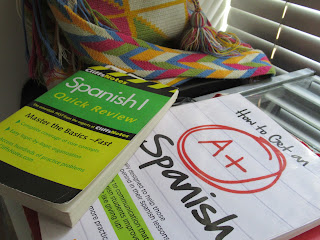''Life isn't about waiting for the storm to pass,
it's about learning to dance in the rain.''
Last Friday afternoon I was working with a delightful group of young Colombian women who want to learn English. Alexandria, Dahiana, and Alejandra are high school seniors from a poor Medellín neighborhood who have big dreams.
Dreams of being accepted into a good college ...
Dreams of obtaining a teaching or medical or business degree ...
Dreams of snagging that ''dream job'' ...
Dreams of traveling the world ...
Dreams of improving their life and the lives of their family.
Even though they learn some English during their grade school and high school years, they realize that they want and need more. So that is why Alexandria, Dahiana, Alejandra ... and about fifty other students show up every Wednesday and Friday afternoon at the San Javier Library for free English lessons organized by Primed Community. Primed's philosophy is that through language learning and social experiences, they can support and empower this beautiful Medellín community that we are fortunate to be a part of.
That Friday I worked on solidifying my students' understanding of the verb ''to be''. In Spanish, different verbs need to be used to state ''I am'' depending on the context. For example:
I am a woman ... Yo soy una mujer
I am happy ... Yo estoy feliz
I am 29 years old ... Yo tengo 29 años ;-)
I am cold ... Yo tengo frío (hardly ever heard in Medellín!)
After we reviewed the ''slight'' irregularities that the verb ''to be'' has in English ...
I am
You are
He/She/It is
We are
They are
... my students realized that they still have it easier than I do when I have to learn the three Spanish versions of ''to be'' as well as when to correctly use each one in Spanish conversation.
Ser: to describe permanent attributes
Yo soy, Tu eres, Él/Ella es, Nosotros somos, Ellos son
(I am, You are, He/She/It is, We are, They are)
Estar: to describe temporary states or locations
Yo estoy, Tu estás, Él/Ella está, Nosotros estamos, Ellos están
(I am, You are, He/She/It is, We are, They are)
Tener: to express age, to feel
Yo tengo, Tu tienes, Él/Ella tiene, Nosotros tenemos, Ellos tienen
(I am, You are, He/She/It is, We are, They are)
Is your high school Spanish coming back??? If so, you may appreciate some Spanish humor:
Teaching (and learning from) young people like these three is always a highlight of my week. They had a better grip on ''to be'' then I have on ''ser'', ''estar'', and ''tener'', so that afternoon we worked on vocabulary building and pronunciation. I have often thought that the bizarre ways in which English words are spelled and pronounced is as bad or worse than the numerous verb conjugations that I have to memorize when learning Spanish.
I proposed an activity that is often very difficult for teenagers. Using the phrase ''I am'', I wanted them to tell me about all of their good qualities. It was difficult for them at first to talk about their positive traits, but soon the words started flowing ...
I am kind (Yo soy amable)
I am organized (Yo soy organizada)
I am 17 years old (Yo tengo 17 años)
I am determined (Yo soy decidida)
I am cheerful (Yo estoy alegre)
I am loving (Yo soy cariñosa)
I am curious (Yo soy curiosa)
And because it was close to dinner time ...
I am hungry (Yo tengo hambre)
But it was another comment that made me realize that, like the rest of the world, these teens have heavy thoughts on their mind.
''¿Cómo se dice, 'estoy preocupada' en inglés?''
How do you say ''I am worried''?
The day before, President Duque of Colombia had declared a health emergency in the country to help contain the outbreak of Covid-19. These three seniors, set to graduate in November, were worried about what it would mean for their academic futures if school had to be canceled for a few weeks.
At that moment, I wished that my Spanish was better than it is. But somehow we had a ''Charlie Brown'' discussion. I was able to encourage them to use their strong qualities of kindness, organization, determination, cheerfulness, curiosity, and love to overcome their worries. By doing that, they can be open to enjoy the good moments that will fill their future. I gave them suggestions of how they can continue to strengthen their English skills at home using on-line apps, videos, and music. They seemed to leave class determined to use the qualities that will help them continue to enjoy the good that surrounds them ... and ultimately become stronger women.

The state of emergency over the Covid-19 pandemic has significantly changed the tone here in Colombia as I imagine it has in your community. The streets are quieter ... schools will be closed for about four weeks ... restaurants are empty ... and there have been mad rushes to the stores for chicken, rice, hand soap and cleaning supplies ... but on the positive side, we can still find paper products that can stand in for toilet paper in a pinch!
There is uncertainty about the storm that is brewing, but there is also the opportunity for us all to use our strengths and ...
Learn to dance in the rain!
Changes as a result of Covid-19 continues to affect our community. As of this weekend, the Colombian government closed its country's borders to non-residents, closed all schools and universities until at least April 20, and suspended any gatherings of 500 people or more. They have discouraged use of the Metro, especially during busy times of the day.
We have noticed these changes affect us this past week we moved to a smaller apartment in a quieter part of Envigado. Thankfully we are surrounded by cute little restaurants that are still open and not very busy. We can easily walk to get any services that we may need. Unfortunately, all our Primed Community English classes and language exchanges have been canceled, so I am following the advice that I gave my students and using on-line resources to continue my Spanish studies at home. I have a local medical doctor and public health nurse as Spanish/English language-learning buddies along with numerous other local friends, so we feel reassured that we would have good support should we need any medical advice. We are currently ''learning to dance in the rain'' while weighing our options of staying here verses returning early to the US.
Wishing you calmness during this stormy time ...
 |
so that you can enjoy the beauty that
blossoms because of the rain! |


































